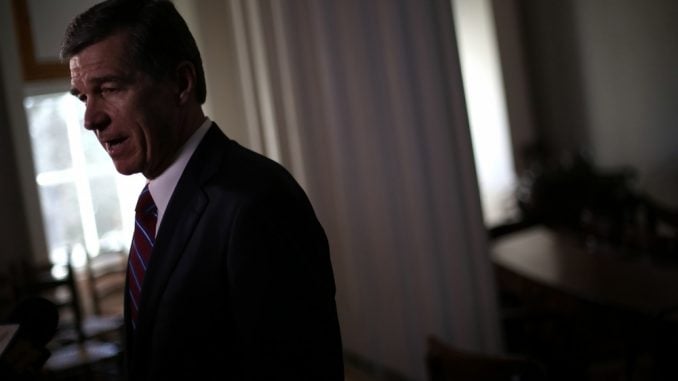
A major report on states’ fiscal health and outlook hit the wires June 15, and it could not come at a worse time for Gov. Roy Cooper. Cooper, who this week vetoed the state budget compromise, is trying to portray the budget as fiscally shaky.
In a hastily called press conference the morning that details of the compromise were released, Cooper said: “I think it may be the most fiscally irresponsible budget I’ve ever seen.”
Even if he was just trying to score political points with hyperbole, it was a strange comment. The one thing voters trust conservatives on is spending restraint. Portraying the GOP in North Carolina as profligates of historic proportions is going to require an immense effort, including obscuring the recent past. Enter the report from the National Association of State Budget Officers: It notes that, “In fiscal 2017, 22 states reported closing budget gaps totaling $7.9 billion. Meanwhile, 12 states reported budget gaps still to be closed this fiscal year.” So, 34 states had to cut spending in mid-stride to avoid a deficit. North Carolina spent $422 million over its enacted 2016-2017 budget and still has a $550 million surplus.
Wait, could Cooper be talking about the fact that across the country, governors are calling for an average spending increase of just 1 percent this year, while the General Assembly’s plan would raise spending 4.9 percent over last year’s spending plan? That would be a queer argument for him to make, considering his own budget proposal raised spending by more than 7 percent. The truth is that it is fiscally prudent for North Carolina to raise spending more than the rest of the nation, due to the relative economic health of the state and the fact that more and more people continue to choose to move here a situation much of the rest of the country would love to have. “The small spending increases,” a Wall Street Journal article reported, “reflect a persistent problem: weak revenue collection that has dogged states in the last couple of years….” Consider North Carolina undogged it is one of just 13 states to see general fund revenue collections come in above projections (another four states were on target). Sales tax revenue jumped 7.7 percent from fiscal 2016 to 2017, the third-highest increase in the nation. And even while reducing personal income tax rates, revenue keeps climbing. Personal income tax collections increased 7.5 percent from 2015 to 2016, then climbed another 1.4 percent higher in 2017, when the rate cut from 5.75 percent to 5.499 percent took effect.
What makes Cooper’s focus on fiscal responsibility more puzzling is the fact that there are plenty of other targets to shoot at in the legislature’s budget, especially if you are a liberal politician. First, if you don’t favor tax cuts from a small-government perspective or as a growth strategy, the tax cuts in the second year of the biennium are an obvious point of contention. Also, Cooper is on record supporting expanding Medicaid eligibility to include able-bodied adults without dependents, something not funded in this budget. And then there are the earmarks, which Jones Street watchers of all political stripes have rightly condemned. (Cooper has less room to talk than most, since the budgets he helped pass when he was in the legislature included plenty of pork. But it’s still a good talking point.)
Since his first press conference, Cooper has shifted his strategy. He has cited some specifics, but mostly liberal platitudes about the budget being “short sighted and small minded” and that it “prioritizes tax breaks for the wealthy and corporations.” He also said the plan would “blow a $600 million hole in our budget” in a few years, a reference to the tax cuts in 2018-2019. Legislative leaders have pointed out, quite forcefully, that their budget accomplishes many of the priorities included in Cooper’s budget plan: raises for teachers and other state employees, a revival of the Teaching Fellows program, and Hurricane Matthew relief, among others. Still, it was probably unrealistic to expect Cooper to sign the budget, even if some Democrats in the General Assembly could cross the aisle and support it. But it was unwise for the governor to loose an opening salvo that referred to fiscal responsibility so specifically. If your strategy is resistance, you should point out your opponents’ weaknesses, not their strengths.
Drew Elliot is a member of the North State Journal’s editorial board, separate from the news staff. Unlike other newspapers, the North State Journal does not publish unsigned editorials; the author or authors of every editorial, letter, op-ed, and column is prominently displayed. To submit a letter or op-ed, see our submission guidelines.



